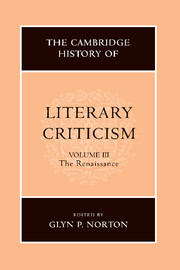Book contents
- Frontmatter
- Introduction
- READING AND INTERPRETATION: AN EMERGING DISCOURSE OF POETICS
- POETICS
- I Humanist classifications
- II The rediscovery and transmission of materials
- III Rhetorical poetics
- IV Literary forms
- 20 Italian epic theory
- 21 The lyric
- 22 Renaissance theatre and the theory of tragedy
- 23 Elizabethan theatrical genres and literary theory
- 24 Defining comedy in the seventeenth century: moral sense and theatrical sensibility
- 25 Dialogue and discussion in the Renaissance
- 26 The essay as criticism
- 27 The genres of epigram and emblem
- 28 Humour and satire in the Renaissance
- THEORIES OF PROSE FICTION
- CONTEXTS OF CRITICISM: METROPOLITAN CULTURE AND SOCIO-LITERARY ENVIRONMENTS
- VOICES OF DISSENT
- STRUCTURES OF THOUGHT
- NEOCLASSICAL ISSUES: BEAUTY, JUDGEMENT, PERSUASION, POLEMICS
- A SURVEY OF NATIONAL DEVELOPMENTS
- Bibliography
- Index
- References
22 - Renaissance theatre and the theory of tragedy
from IV - Literary forms
Published online by Cambridge University Press: 28 March 2008
- Frontmatter
- Introduction
- READING AND INTERPRETATION: AN EMERGING DISCOURSE OF POETICS
- POETICS
- I Humanist classifications
- II The rediscovery and transmission of materials
- III Rhetorical poetics
- IV Literary forms
- 20 Italian epic theory
- 21 The lyric
- 22 Renaissance theatre and the theory of tragedy
- 23 Elizabethan theatrical genres and literary theory
- 24 Defining comedy in the seventeenth century: moral sense and theatrical sensibility
- 25 Dialogue and discussion in the Renaissance
- 26 The essay as criticism
- 27 The genres of epigram and emblem
- 28 Humour and satire in the Renaissance
- THEORIES OF PROSE FICTION
- CONTEXTS OF CRITICISM: METROPOLITAN CULTURE AND SOCIO-LITERARY ENVIRONMENTS
- VOICES OF DISSENT
- STRUCTURES OF THOUGHT
- NEOCLASSICAL ISSUES: BEAUTY, JUDGEMENT, PERSUASION, POLEMICS
- A SURVEY OF NATIONAL DEVELOPMENTS
- Bibliography
- Index
- References
Summary
To deal briefly and justly with tragedy from the fifteenth to the seventeenth century in Europe is not easy. In wit and fecundity of critical debate, variety and brilliance of practice, and unusual abundance of both, these years are exceptional in the record of any artistic production. One might think tragedy so rare an occurrence – fifth-century Athens, Renaissance Europe, Enlightenment Germany, Russia, and Scandinavia – as to be a narrow endeavour, easy to epitomize. Renaissance tragedy, however, was so fundamental to the establishment of vernaculars, the development of literature, the making of national theatres, to political, religious, educational, and epistemological debate, indeed, to the ‘passage to modernity’, as to make its study central to any understanding of modern Western culture. In tragedy, humanists found a tie with a striking grandeur of the ancients. To imitate it seemed a way to grasp their most solemn thoughts and inhabit their deepest emotions. It was an art form old but unfamiliar; it offered a kind of acid test for claims of renewal. Those who suggested tragedy to be familiar and local provoked vehement debate.
Explaining tragedy to the reader of his French translation of Electra in 1537, the French scholar and diplomat, Lazare de Baïf, called it ‘a morality composed of great calamities, murders, and adversities inflicted on noble and excellent personages’. In 1548 Thomas Sebillet averred that ‘French morality in a way substitutes for Greek and Latin tragedy, especially in that it treats serious and princely deeds. And if the French had agreed that morality were always to end in grief and unhappiness, morality would be tragedy.’
- Type
- Chapter
- Information
- The Cambridge History of Literary Criticism , pp. 229 - 247Publisher: Cambridge University PressPrint publication year: 1999
References
- 4
- Cited by

